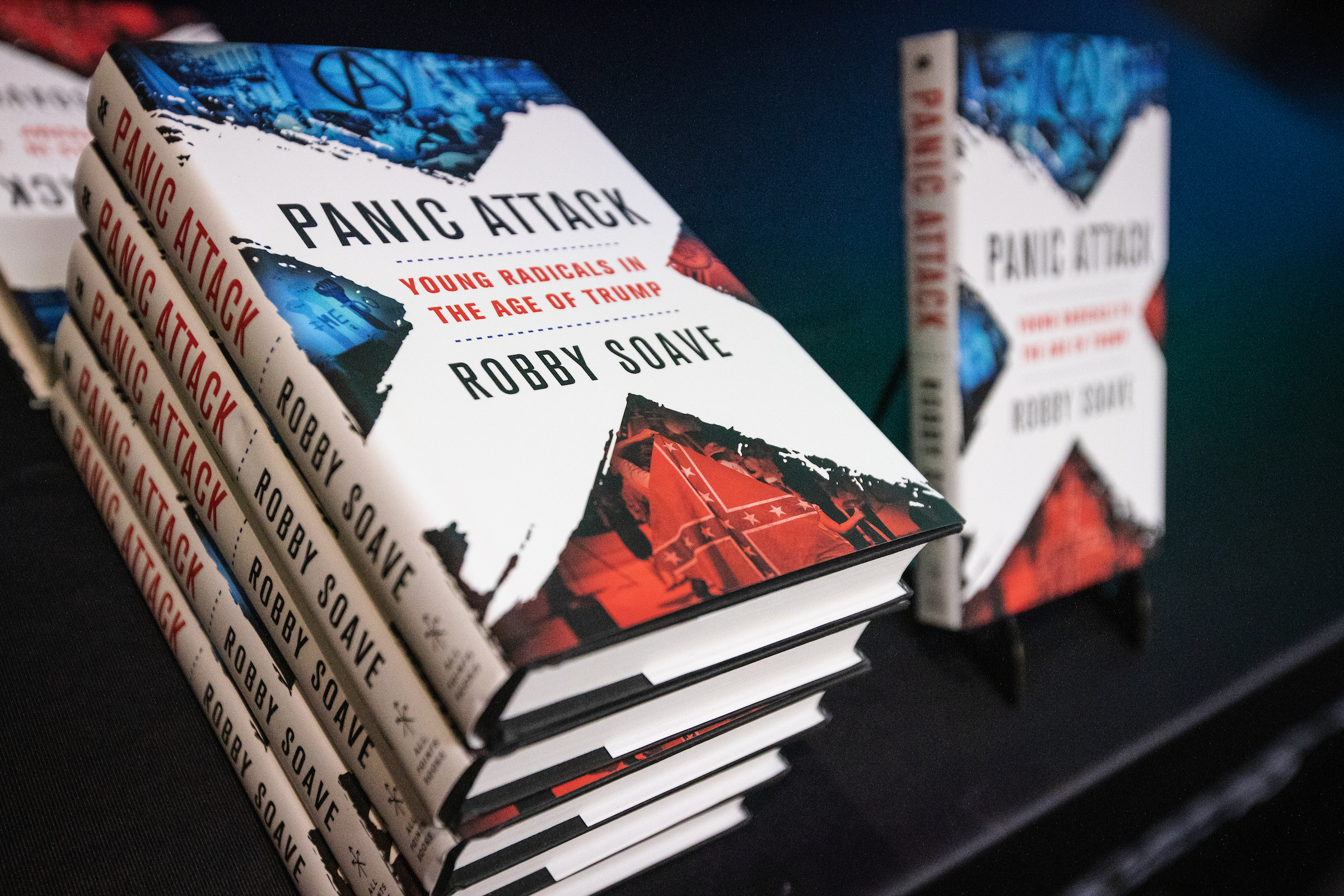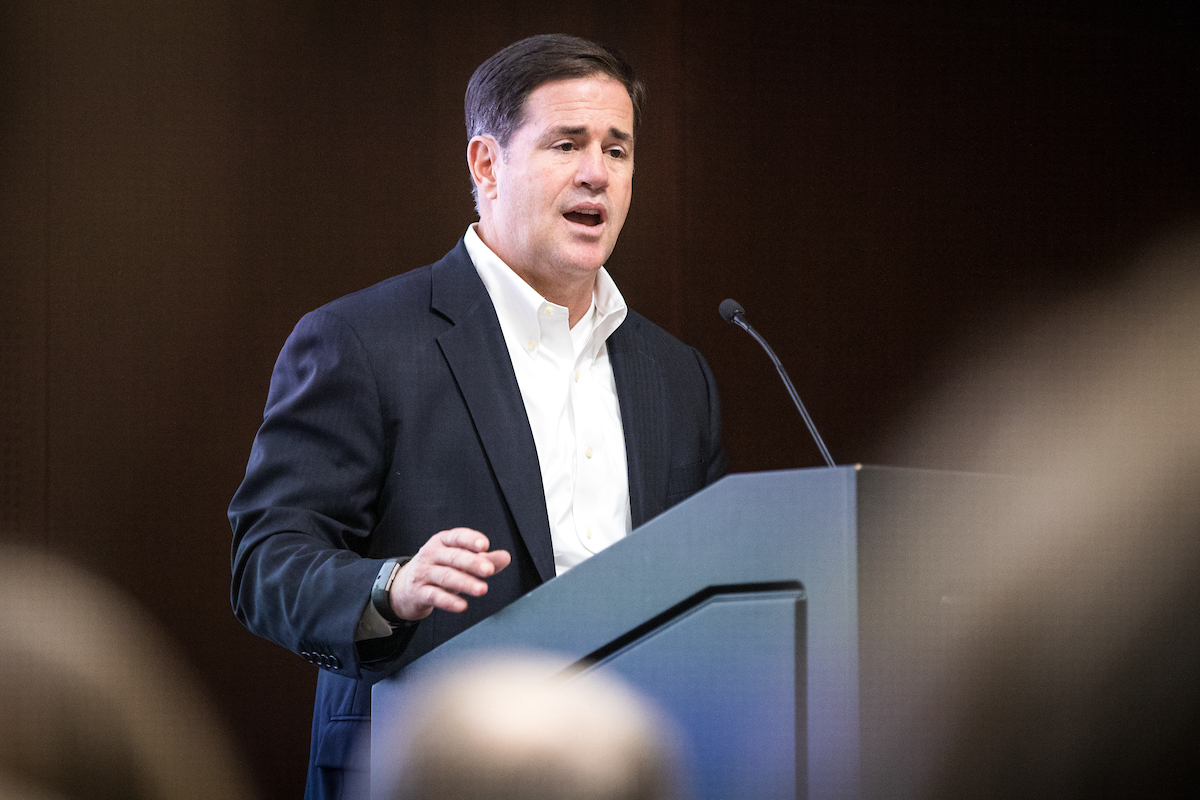Campus discourse has been hijacked by a few radical 'cancelers,' says Robby Soave

Frequent incidents over the past few years in which appearances by conservative speakers have been shut down or canceled at college campuses are an alarming threat to free speech, according to libertarian author Robby Soave.
Soave spoke at Arizona State University on Wednesday night in a talk titled, “Panic Attack: Young Radicals in the Age of Trump,” which is also the name of his recently published book. The talk was sponsored jointly by the School of Civic and Economic Thought and Leadership and the Goldwater Institute in Phoenix.
“My book was my attempt to grapple with a phenomenon that probably many of you have taken notice of, which is the climate of hostility to certain principles that I believe in very strongly as a libertarian — things like free speech and due process,” said Soave, who is an associate editor at the website Reason.com.
Soave's new book discusses the state of free speech on college campuses. Photo by Charlie Leight/ASU Now
“Things that used to be so vital to the left that have been increasingly under attack.”
Soave said that the most glaring examples have been on college campuses, but it has also happened on social media, in offices and in government.
“It’s the drive to cancel people, to get them fired or run out of society for having said something that offends you, even if it was unintentional, even if it was misinterpreted and it wasn’t meant to trigger you at all,” he said.
“That drive to destroy people for menial sins has migrated from the college campus, where a small number of very radical students has prevented conservative speakers from coming to campus.
“And it has prevented their own often stridently progressive professors from instructing them because they’ll say something the students object to and then there will be an investigation and the professor learns they have to shut up out of a risk of offending perhaps one person in the classroom.”
The problem is not generational, he said.
“The problem is a small number, a radical cabal, who have gained some degree of power on campuses in the last two years and have been able to hijack the conversation,” he said.
Soave gave many examples from his book, including:
• In 2017, dozens of students at Middlebury College tried to shut down a speech by Charles Murray, who was invited by a conservative student group and whose books have linked socioeconomic status with race and intelligence. A Middlebury professor was injured in pushing and shoving after the speech.
• Evergreen State College biology Professor Bret Weinstein resigned, and was later awarded a $500,000 settlement, over campus protests that erupted after he challenged an event that asked white students and faculty to leave campus for a day. He was confronted by protesting students and campus police told him they couldn’t guarantee his safety.
• At Harvard, law Professor Ronald Sullivan Jr. was fired as a faculty dean in May after students protested his decision to represent disgraced Hollywood mogul Harvey Weinstein.
“Harvard has mounted what can only be called all-out war on the principles of free speech at an administrative level,” Soave said.
Not all of the incidents involved progressive students shutting down conservative speakers, he said, but conservative activists are usually outnumbered on campuses. He said some conservative groups have invited provocative speakers because they wanted to incite a shutdown.
“‘Who will trigger the left the most?’ If that is your mentality you are not making a good-faith effort to foster healthy civil discourse between two sides,” he said.
Soave described how the free speech movement started with liberals at the University of California at Berkeley in the 1960s, and how the activists were so dedicated to the idea that they invited an actual Nazi to campus and then dressed up in Nazi regalia as a stunt to publicize the talk.
“No one shut him down. They gleaned insight into how someone could hold those abhorrent views,” he said. “Can you imagine that happening today? And this was less than 20 years after Nazis were an existential threat to life on the planet.”
So what comes next? Not government interference, he said.
“What we need is a cultural change. We need to say, ‘No, we will not demand you lose your job or be run off campus.’ The people who want that to happen, I really do believe, are a minority.”
Often, it only takes one person to speak up, and he gave an example of a student who confronted protestors and asked that a speaker be allowed to continue.
“It robbed the mob of their power,” he said. “Calling out the canceler can work and I’ve seen it work and I encourage us all to be more bold in doing so.”
During the question period after his talk, Soave was asked to elaborate on his title, “.. In the Age of Trump.”
“Many of the phenomena I describe predate (Donald) Trump and have nothing to do with Trump,” he said, noting that all elections inflame tensions on campus.
“Because of who Trump is and his style, he has set aflame campus life the way no one else would. He is always with us because he is in the 24-hour news cycle. And he’s positioned the media as his rival tribe. And you have to pick one or the other, and there’s no room for anyone to pick Trump some of the time and to disagree with him some of the time, which is what I do,” he said.
“It bifurcates us.”
Gov. Doug Ducey at Wednesday's event. Photo by Charlie Leight/ASU Now
Gov. Doug Ducey introduced Soave, who he called “a beacon of common-sense reporting.”
“He puts in the hard work and does the fundamentals. He asks the right questions. He does the research,” Ducey said.
“He articulates clearly and isn’t afraid to take a stand in the face of pressure.”
Soave praised the School of Civic and Economic Thought and Leadership for promoting difficult conversations between people who disagree.
“This is exactly what a college campus is supposed to be about and has been lost at so many elite institutions.”
Top photo: Pundit, editor, author and columnist Robby Soave speaks about free speech and common sense on college campuses at the Memorial Union on Sept. 4, 2019. Photo by Charlie Leight/ASU Now
More Law, journalism and politics

When police moonlight, who’s watching?
When police officers work off-duty security jobs, or “moonlight,” often in uniform and sometimes with full police powers, the lines between public service and private interest can blur.A new…

Arizona tax changes this year: What to know
Let’s face it: Tax season is rarely anyone’s favorite time of year. And this time around, there’s an added wrinkle as Arizona’s tax code is in flux.Arizona lawmakers are debating which of the recent…

ASU course inspires students from different majors to engage with government
On a brisk January morning, about 50 students file into a classroom on Arizona State University's Downtown Phoenix campus. Many of the students are majoring in journalism or nursing but they are…

